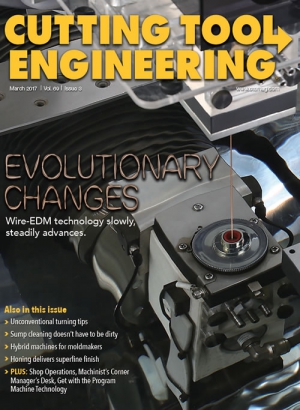When purchasing consumer products, most of us quickly decide to pass on extended warranties. But extended machine tool warranties may merit more careful consideration.
In the machine tool industry, extended warranties come in a variety of forms. Those from Haas Automation Inc., Oxnard, Calif., cover the parts and labor required to fix any machine problem for a full year after the standard 1-year warranty expires. That sets it apart from commonly offered extended warranties that put a limit on run-time hours, particularly for high-speed milling spindles, according to Jeff Law, director of global service at Haas.
For example, Law noted, a spindle might be limited to 2,000 hours of operating time, so an end user who runs three shifts a day could use up what’s billed as a 1-year extended warranty in just 4 to 8 months. By contrast, “our extended warranties cover every part of the machine for a full 8,760 hours—24 hours a day for 365 days,” Law said.

The cost of Haas extended warranties ranges from $1,695 for base-model mills to $8,795 for more complex units, such as 5-axis universal machining centers. For the majority of Haas machines, an extended warranty costs $6,195. It can be purchased any time before the standard warranty expires. Law added that customers with skilled maintenance crews capable of making repairs may want to pass on them.
Like Haas, Indianapolis-based Hurco North America offers machine tool buyers the option of purchasing a 1-year extended warranty any time before expiration of the standard warranty. But Hurco’s offerings cover only parts, although individual distributors selling Hurco machines can offer extended labor warranties as well, noted Douglas Hilker, Hurco’s national service manager.
Prices for extended Hurco warranties range from $4,995 to $8,995. Such an outlay can make sense because “individual part costs may be a little extreme for a lot of mom-and-pop shops,” Hilker said, adding that servodrives can run from $5,000 to $6,000 and spindle drives up to about $10,000. “An extended warranty gives them peace of mind because they know they won’t have any out-of-pocket parts expenses of that kind.”
Nevertheless, Hilker estimates that only about 15 percent of Hurco customers purchase extended warranties. He believes one reason is customer uncertainty about future business. “Customers who know what their long-term projects are going to be are generally the ones who would purchase these contracts,” he said.
Tormach Inc., Waunakee, Wis., also offers a 1-year extended parts warranty with its small CNC machines. The Tormach warranty covers only electrical components. “We don’t offer a warranty on mechanical things because they can wear out through normal use,” explained Brennan Williams, Tormach’s technical support manager.
Though part installation isn’t included in the warranty coverage, Tormach provides free technical support to walk customers through the installation process, Williams added.
Available during the first 10 months of the customer’s standard warranty coverage, Tormach’s extended warranties are relatively inexpensive, with those for the company’s bigger machines running just $450. “If you have a problem with a machine controller, the cost of that is more than our extended warranty,” Williams said.
In addition to machine tool builders and distributors, extended warranties can be purchased from some suppliers of critical machine tool components. For example, Mitsubishi Electric Automation Inc., Vernon Hills, Ill., offers 1-year extended warranties with its automation equipment for machine tools. Options include an $800 parts-only warranty that includes control equipment, drives and cables, a $1,200 warranty that covers the same parts plus four service calls, and a $2,400 version that also covers motors and feedback devices and includes unlimited service calls.
These warranties help end users keep maintenance costs fixed, allowing them to budget a certain amount for maintenance for the coming year, said Justin Kueker, a business development specialist at Mitsubishi. And if they lack a maintenance department entirely, “they can get a labor warranty and we would come in and fix their machine for them.”
So even if you reflexively decline the extended warranties available for other products, at least pay attention to the person describing the coverage-extending options for your next machine tool.
Related Glossary Terms
- centers
centers
Cone-shaped pins that support a workpiece by one or two ends during machining. The centers fit into holes drilled in the workpiece ends. Centers that turn with the workpiece are called “live” centers; those that do not are called “dead” centers.
- computer numerical control ( CNC)
computer numerical control ( CNC)
Microprocessor-based controller dedicated to a machine tool that permits the creation or modification of parts. Programmed numerical control activates the machine’s servos and spindle drives and controls the various machining operations. See DNC, direct numerical control; NC, numerical control.
- gang cutting ( milling)
gang cutting ( milling)
Machining with several cutters mounted on a single arbor, generally for simultaneous cutting.
- milling
milling
Machining operation in which metal or other material is removed by applying power to a rotating cutter. In vertical milling, the cutting tool is mounted vertically on the spindle. In horizontal milling, the cutting tool is mounted horizontally, either directly on the spindle or on an arbor. Horizontal milling is further broken down into conventional milling, where the cutter rotates opposite the direction of feed, or “up” into the workpiece; and climb milling, where the cutter rotates in the direction of feed, or “down” into the workpiece. Milling operations include plane or surface milling, endmilling, facemilling, angle milling, form milling and profiling.








